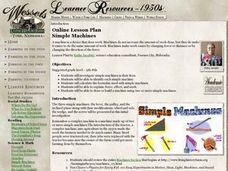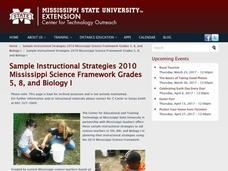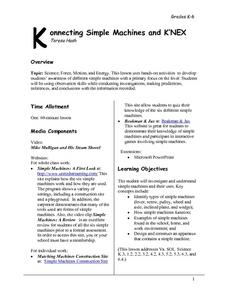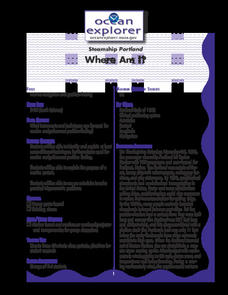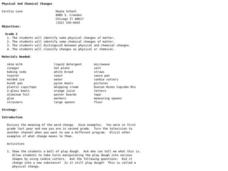Smithsonian Institution
Reflections of the Sea
Students, after listening to a selection of Gulliver's Travels, complete a worksheet about basic terms associated with boats, ships, and sailing. They create flag after researching semaphore flagging systems.
Curated OER
How Do Car Engines Work?
Students perform an experiment which simulates what happens inside an internal combustion engine. They explain how the chemical reaction they witnessed is similar to what happens inside the car engine.
Curated OER
Farming in the 1930's
Students research and conduct experiments with several types of simple machines. They examine levers, pulleys, inclined planes, wheels, axles, wedges and screws and then consider the physics behind "Green Eggs and Ham".
Curated OER
"Finding" Horsepower
Students investigate horsepower as a unit of power. They examine history and discover that scientists and engineers of high achievement are considered to be among the most valued contributors to their culture.
Curated OER
The Ethics of the Bomb: What Would You Do?
Young scholars research the use of the atomic bomb in WWII, analyze the human costs of dropping the bomb and identify the pros and cons. They develop a PowerPoint presentation on the effects of an atomic bomb dropped on their hometown.
Curated OER
The Wild, Wild West
Sixth graders research the history of the transcontinental railroad. They use advertising propaganda techniques to design and create a poster encouraging people to explore the West by rail.
Curated OER
Rollin' on The River - the Hudson River!
Students examine how the Hudson River was important to the development of the United States. They examine the role of steamboats played in the development of the Hudson River Valley.
Curated OER
Konnecting Simple Machines and K'Nex
Students study and identify different types of simple machines and how they work. They design a simple machine.
Curated OER
Where Am I?
Sudents examine the types of instruments that can be used for marine navigation and position-finding. They practice using an astrolabe to solve trigonometric problems.
Curated OER
X-Storms
Students compare and contrast 3 types of extreme storms. They obtain real-time and historical meteorological data regarding 2 specific storms and then analyze the data to determine what type of storm each was.
Curated OER
Physical And Chemical Changes
Second graders identify physical and chemical changes of matter. They distinguish between physical and chemical changes. They classify changes as physical or chemical.
Curated OER
Was There an Industial Revolution? Americans at Work Before the Civil War
Students tabulate the First Industrial Revolution where a significant number of inventions and innovations appeared transforming American life. Cite examples of change (ex. telegraph) in the lives of Americans during the era of question....
Curated OER
Evaporation
Fourth graders study the water cycle and the different processes involved, specifically evaporation. They explore the processes of evaporation through hands-on collaborative activities and relate learning to life through...
Curated OER
What's in the Water?
Students make a water sampler and use proper techniques to collect water.They write a essay explaining the inter-relationship of factors such as temperature, pH, dissolved oxygen, nitrates, and phosphates in a lake that might cause a...
Curated OER
Using Abiotic and Biotic Parameters to Monitor Air Quality
Students identify the abiotic factors that influence a river or stream and the organisms that live in it. They measure several abiotic and biotic parameters to gauge water quality. Students examine the biotic environment by identifying...
Curated OER
States of Matter
Fourth graders define the term matter. They compare properties of solids, liquids, and gases. They describe how matter changes from one state to another. They classify objects as either solid, liquid, or gas.
Curated OER
Activity #1 Reactions: Chemical or Physical?
Students distinguish between physical changes and chemical changes. They comprehend that chemical reactions produce new substances with compositions and properites which are different than those of the starting materials. Pupils also...
Curated OER
Habitable Zones
Students focus on stellar luminosities to estimate size of habitable zones, map out habitable zone around hot light bulbs that serve as models of stars, investigate how size of model "habitable zone" around light bulbs depends on...
Curated OER
State Change
Eighth graders explore the physical change of matter. As a class, they discuss their favorite super hero and determine if the hero undergoes a physical or chemical change. Students examine the change of state and phase change. In groups,...
Curated OER
What's the Matter?
Students explore the components of matter. They discover what matter is, the states of matter, and how heat and cold cause it to change states in an online format. In addition, they complete internet-based lessons, activities, and quizzes.
Curated OER
It Matters
Students use descriptive vocabulary to discuss the attributes of matter. Then, they sort objects or pictures by the type of matter they are comprised of. Finally, students match objects of matter with similar attributes and create a...
National First Ladies' Library
Terrorism and Tolerance
Learners define the concepts of terrorism and tolerance using various resources. They examine the concept of stereotype, consider stereotypes often applied to Arabs, Middle Easterners, and Muslims, and attempt to discredit these...
Curated OER
CTBS Vocabulary Practice #1
In this vocabulary practice worksheet, students identify the synonym and antonym of sixteen multiple choice questions. Students also choose the correct word to complete nine multiple choice sentences, for a total of twenty five questions.
Curated OER
Matter and Atoms
In this matter and atoms instructional activity, students will fill in the number of protons, electrons, and neutrons for five different atoms. Then students will fill in the blanks of five statements with words from a word bank....
Other popular searches
- Steamboats
- The Steamboat
- Steamboat Activity
- Steam Shovel
- Steamboats Hudson River
- Steam Engines
- Impact of Steamboat
- Invention of the Steamboat
- Steamboat Travel
- Steamboat Invention
- Steam Locomotive
- Steam Engine Plans




